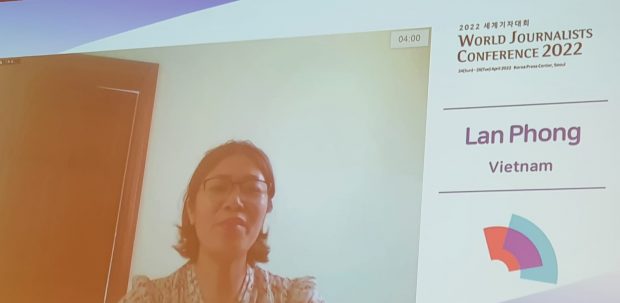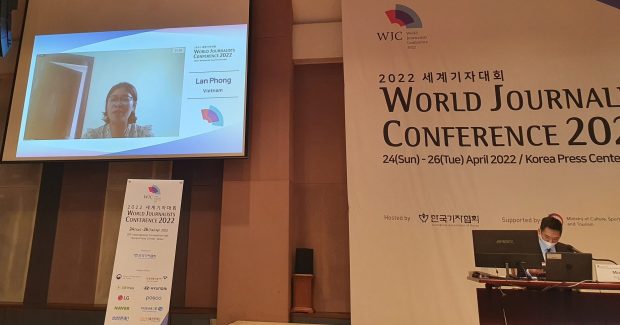Journalism helps change society for the better

Speech delivered by Lan Phong, Dantri Online Newspaper, Vietnam, at the World Journalists Conference (WJC2022)
“Over the years, journalism has been creating social changes by providing information for the public, thus helping raise awareness among them and pushing local authorities to have sound decisions and policies. Journalism has actually changed society in some ways.
Firstly, journalism has the ability to incite social change by reporting on subjects that have been deeply-rooted in people’s minds.
For instance, in Vietnam, gender inequality is a long problem that was influenced by Confucianism and the feudal view of male preference. In the past, men used to play the most important roles in the family and always have final say. Men were allowed to go to schools while girls were not.
The primary factor driving son preference among many couples is deeply rooted in the traditional culture, and this has resulted in sex selection at birth, which is still common in Vietnamese society now.
With their voices, journalists in Vietnam have actively joined in fighting against gender discrimination to defend the rights of women and girls. They have organised or promoted various events and propagandas on gender inequality in order to raise public awareness to change people’s behaviours and call for the amendment of relevant laws and policies on the issue.
My newspaper Dantri is the voice of the Vietnamese Ministry of Labour, Invalids and Social Affairs. We pay a lot of attention to protecting the rights of vulnerable people including women and girls. Last year we together with UN agencies in Vietnam launched the national action month for gender equality and gender-based violence prevention and response. The event was held as reports have revealed that the COVID-19 pandemic has caused a spike in inequality, with women and girls bearing more disadvantages in the past two years.
Secondly, I think that journalism has acted as a public watchdog to help fight against corruption and demand accountability from local authorities.
A lot of corruption cases in Vietnam have been uncovered by local investigative journalists who have helped provide the general public with information, which allows for demands of greater transparency from governments.
In 2016, the vice chairman of the Hau Giang Province, Trinh Xuan Thanh, was brought under scrutiny after he was found driving a luxurious Lexus 570 with a blue-colored plate which is a designated car for a government official. Photos of the car were spread on various social websites with the public questioning that it was not designated by the government for an official at Thanh’s position. Many newspapers have joined in the issue and revealed lots of illegally acquired assets and wrongdoings by the official. He was then sentenced to 18 years in jail.
This was just one among many other corruption cases that have been uncovered in Vietnam by local journalists. Several high-profile government officials, top military officers and business figures have been arrested and jailed for crimes including graft, money laundering and economic mismanagement after the media brought them to light.
Another role of journalism is to help speak for some certain groups of people such as prisoners of conscience in pursuit of justice, refugees seeking shelter or victims of violence and trafficking in need of rescue.
The 2019 National Study on Violence against Women in Vietnam which was carried out by the Ministry of Labour, Invalids and Social Affairs, with technical and financial support from UNFPA and Australia Government showed that 62.9 percent of women in Vietnam experiencing at least one form of violence, including physical, economic, emotional, and controlling behaviour and sexual violence. 90.4 percent of gender-based violence survivors did not seek help from authority and half of them never told anyone about the violence.

Local journalists have helped bring out many cases of trafficking and gender-based violence against women and rescued many victims.
And last but not least, journalism has been spreading good work by introducing ordinary yet inspiring people, such as activists who run charity groups to provide free meals to poor people, save abandoned dogs and cats, or collect rubbish on the beaches, etc. By reporting on their work, journalists have contributed in inspiring and calling on the public to do helpful work for a better society.
According to the American Press Institute website, “the purpose and importance of journalism is to inform society with the information they need to live their lives, information that they need to make decisions about different things.”
With all those contributions, I believe journalism is a powerful tool to make the society change for the better.























































